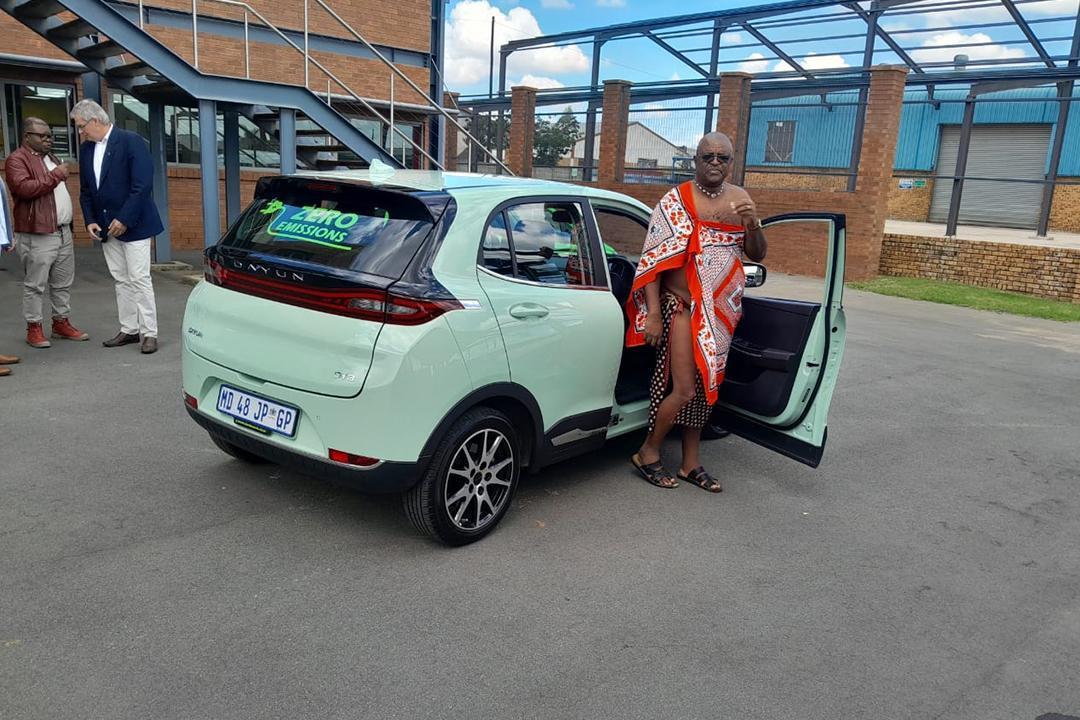Africa-Press – Eswatini. Eswatini is on the cusp of an automotive revolution as the country’s first electric cars and scooters are set to make their debut on local roads.
This development was revealed by Philani Maswati Charity Organisation Chairperson and philanthropist Lutfo Dlamini, following a recent business trip to South Africa.
Dlamini, who holds business interests in various companies and serves as chairman and board member across several organisations, disclosed that he had travelled to Johannesburg to finalise a dealership agreement that will see electric vehicles (EVs) introduced into the kingdom for the first time.
He described the meeting as a success and confirmed that the vehicles will be brought into the country under a new partnership with AKATA Corporation, a South Africa and DRC-based company led by Executive Chairman Alwyn Steenkamp.
Speaking over the weekend, Dlamini revealed that he had the opportunity to drive an electric car for the first time during the trip, calling the experience a glimpse into the future.
He stated that while the official launch is still pending the registration of the partnership and securing of business premises, the first batch of cars and scooters will be brought into Eswatini within the next two weeks for demonstration purposes.
“We want to test the market first and give people a chance to see, experience, and admire these vehicles,” he said.
Dlamini explained that the initiative presents a significant business opportunity for local entrepreneurs, particularly those in the public transport sector. He emphasised the affordability of the vehicles and their suitability for taxi operators looking to reduce operational costs.
“This is a game changer to reduce emissions in the country. These electric vehicles will be suitable for both public transportation and individual use,” he said, adding that the vehicles are expected to cut operational costs by up to 65% since they run on electricity and solar power.
He further mentioned that the long-term plan includes the establishment of battery stations across the country, replacing the traditional reliance on fuel stations. The business venture, he said, is part of a broader Information Technology (IT) project focused on sustainable development across the African continent.
“Our partners will be visiting Eswatini after Easter to officially launch the project, which will be based in Manzini,” Dlamini added.
He concluded by expressing optimism about the potential of the project, stating, “The future has arrived. Imagine a car using the sun instead of fuel? As TSD Group, we are excited by this partnership. But let’s wait for the launch to share more details.”
Background on Electric Cars in Africa
The adoption of electric vehicles in Africa has been gradually gaining momentum in recent years. While countries like South Africa, Kenya, and Rwanda have taken early steps in promoting EV use, widespread adoption remains limited due to infrastructure challenges, high costs, and lack of policy support.
However, as the global push towards clean energy intensifies, more African nations are beginning to explore sustainable transport alternatives. Electric vehicles offer a promising solution to reduce greenhouse gas emissions, cut fuel imports, and create green jobs—making them a strategic investment for the continent’s future.
Eswatini’s entry into the electric vehicle market marks a significant milestone and aligns with broader regional efforts to transition towards environmentally friendly and economically sustainable transportation systems.
For More News And Analysis About Eswatini Follow Africa-Press







